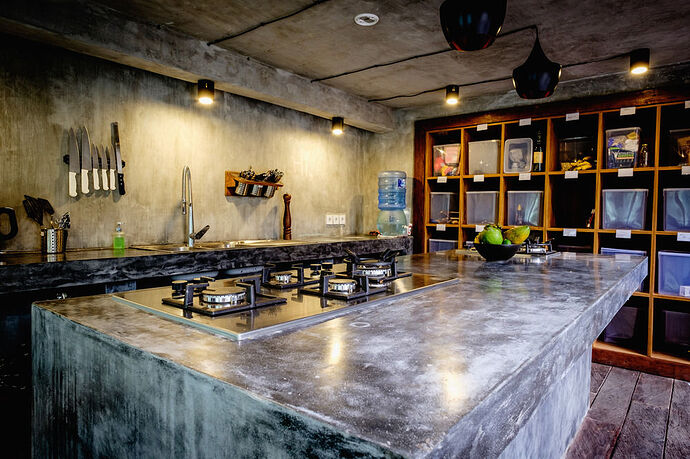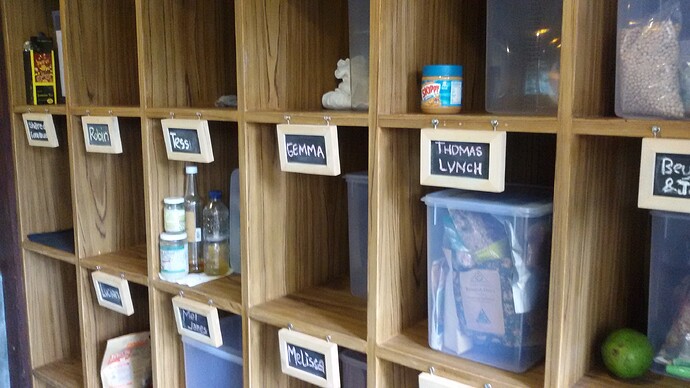Nadia and I are at ROAM Ubud. ROAM is a company that runs several sites worldwide (Miami and Ubud are fully operational, London and Tokyo are just kickstarting, more are supposed to follow). At least here in Ubud, it offers an experience which is about 3/4 hotel and 1/4 co-living. It has 21 en-suite rooms, a rooftop coworking space, a café, and a communal kitchen opening onto a a courtyard dominated by a small swimming pool (“the chill room”). It’s not cheap, especially by Bali standards: a room costs 500 USD a week, or 1,800 USD a month. For this money you get the use of all facilities, weekly housekeeping, some free stuff in the kitchen.
It is much more sociable than a hotel. We have a community manager, a private Facebook group, a dog called Lu. We are given stickers and other ROAM-branded freebies to foster a sense of identity. We smile and say hello, and hang out around the kitchen.
But it is not a “real” home, either. Everyone is passing through: two weeks, three weeks, a month. The person who has been here the longest has been here for four months. One guy came to ROAM at first, but then he moved out to a cheaper hotel. He continues to use the coworking space. Someone joked that it must be hard for Lu to live in a place where people keep leaving. I smiled and nodded, but could not help thinking it must be hard for people, too. I think about The Reef as a real home, for myself and others. No doubt, some people will be passing through; but others will stay. Transients contribute to The Reef by bringing new information and experiences. Residents contribute by encoding them into institutional memory and social capital.
Something else that’s missing is the sense of a common orientation. The unMonastery, whatever its other problems, definitely had that. People pursued different goals, but it was clear that we were all going to the same place. To the extent that there is an orientation here, it is that of advanced “hot money” capitalism. Most people are midlevel tech freelancers, doing remote work for clients in America or Europe. Two people (out of a dozen we spoke to) qualify themselves as investors. Their goal is not work-related, but life-related: be in a warm, hospitable, low-cost-of-labour country. To achieve this, it is not so important what you do. Just make sure you get paid American or Northern European fees, and spend them where yoga classes, massages and margaritas are cheap. This only works if Balinese labour is (and stays) cheap for middle-class Westerners. For the moment everything works, in the sense that the Bali province is better off than most other Indonesian territories. But it turns out that real estate prices are rising fast. Landlords are getting wealthy by renting or selling prime real estate to Western entrepreneurs, the only ones who can pay top prices. Bali’s (and ROAM’s) relaxed, fun vibe is underwritten by participating in exploitative, long-run unstable social dynamics. This is not what I would want for The Reef.
That said, there are quite a few tricks we can learn from ROAM Ubud.
- About 20 units. ROAM has 21 rooms, about 2/3 occupied now. The Bovisa co-housing has about 30 apartments. This size makes the space always alive and populated. It is quite ambitious for The Reef Version 1. Maybe we can find some hacks that will produce similar effects with fewer residents. One is to have the Edgeryders office there, which means 2-3 people will almost always be around.
- Only one kitchen. As in the unMonastery, ROAM's kitchen is the undisputed center of communal life. It makes unplanned, random encounters much more likely. Good.
- "Island" cooking area. The cooking area is not lying against a wall, but free-standing. This means more people can use it at the same time, and chat to each other as they work.
- Nametagged shelves for personal food items. Nice touch. Nametags allow for some private food purchases, and remind people that they are a part of a collective.
- Free staple foods. ROAM bulk-buys things like tea, milk, bread and oil, and makes them available for free. It is a nice touch that costs very little but makes a big difference in our quality of life.
- En suite rooms. Not everyone wants to be social all the time. Your own room and your own bathroom form a little cocoon where you can isolate yourself when you want to be on your own. Again, this may or may not be possible in Version 1.
Do you have experience of a co-living space? We would be grateful if you shared it with us.



